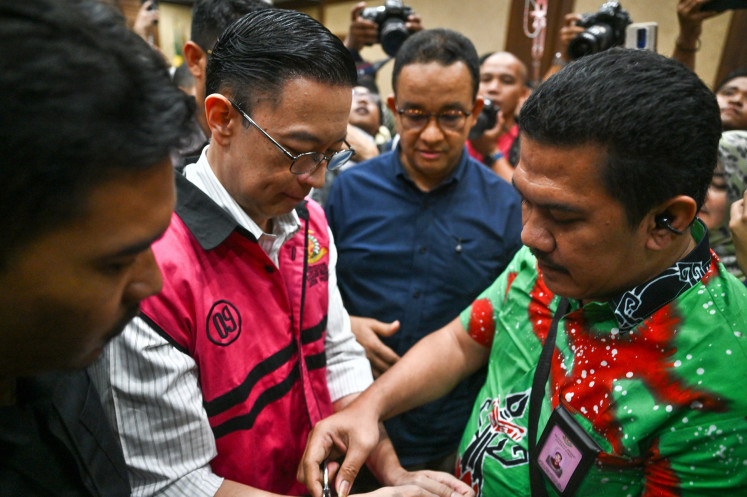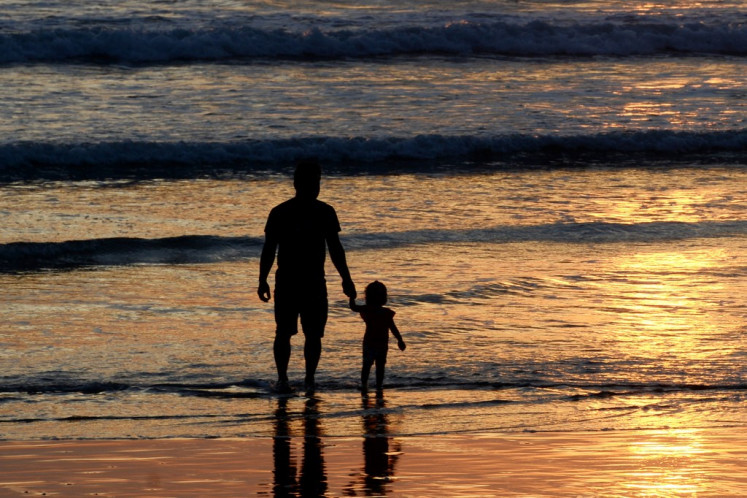Popular Reads
Top Results
Can't find what you're looking for?
View all search resultsPopular Reads
Top Results
Can't find what you're looking for?
View all search resultsRise in revenue despite issues to address: Customs chief
Customs and excise director general Agung Kuswandono was perplexed upon finding that an international-class airport such as Sultan Hasanuddin of Makassar, South Sulawesi, lacked x-rays to scan for taxable and prohibited goods
Change text size
Gift Premium Articles
to Anyone
C
ustoms and excise director general Agung Kuswandono was perplexed upon finding that an international-class airport such as Sultan Hasanuddin of Makassar, South Sulawesi, lacked x-rays to scan for taxable and prohibited goods.
He was also concerned that on his recent trip to Pantoloan marina in Palu, Central Sulawesi, there was a lack of patrol boats to prevent smuggling.
These problems, coupled with the graft that infests his agency, illustrate the obstacles confronted by the 44-year-old customs official in optimizing state revenue collection.
But Agung remains upbeat his office will secure this year’s collection target.
So far this year, revenue collection from customs and excise has reached almost 95 percent of the target, at Rp 108.9 trillion (US$12.1 billion). The figure comprises import duties (Rp 21.03 trillion), export duties (Rp 24.88 trillion) and excise (Rp 62.99 trillion).
“Collection in November may see us achieve the target,” said Agung, who took office earlier this year, on Friday.
The customs and excise revenue target for this year is set at Rp 115 trillion, according to the revised 2011 state budget. The figure is 35 percent higher than the initial state budget target following a commodities boom, particularly in crude palm oil, of which Indonesia is the world’s largest exporter.
The target will increase to over Rp 118 trillion next year.
Although revenues from customs and excise account for more than 10 percent of overall state income, coordination and facilities to boost revenues are still lacking.
“I came to Makassar to check on our office there. The airport was fascinating, but the customs facilities are far from sufficient. Now, we have added two x-ray machines to improve the customs performance,” said Agung, adding that his office was not informed prior to the plans to upgrade the airport to international level.
“Our office was not invited to participate in developing international airports such as Makassar and Lombok. So, customs could not provide sufficient infrastructure to safeguard us from illegally imported goods,” he said.
Customs and excise coverage areas comprise airports, seaports and border lines to avoid the smuggling of goods and services that are taxable or harmful to the public such as narcotics.
“Next year, the challenges [in collecting revenue] will be harder, given the many free trade agreements [FTAs] that will see the gradual decline of import and export duties to zero percent and the expected global economic slowdown that will slow global trade,” Agung said.
The office will also confront other challenges in implementing a policy of domestic-product protectionism by restricting exports of raw materials to help develop local processing industries.
Agung cited the government’s plan to restrict rattan exports to support the domestic furniture industry as an example of challenges for the state revenue collection from export duties.
Economist A. Tony Prasetiantono, director of Gadjah Mada University’s (UGM) center of economic and public policy studies said the optimization of revenue collection from customs and excise was determined by the integrity of the human resources and infrastructure and technology.
“These need to be improved,” he said.
Technology and infrastructure are a “necessary condition”, while integrity is a “sufficient condition”, Tony said, lauding the bureaucracy reforms in the customs and excise office which include remuneration.
Having already improved the salary and incentive system at his office, Agung said he was currently proposing to give more incentives to officials who were successful in catching smugglers by increasing the premium to 25 percent of the value of the smuggled goods with a maximum value of Rp 2.5 billion.
“The premium will be given to those who have been successful in catching illegal goods. It will be accumulated for a year and shared among the office, head, sailors, etc,” he said.










